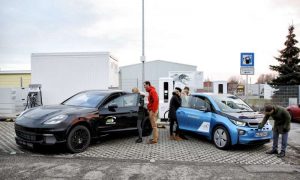FastCharge prototype station shows three-minute time feat
by Nancy Cohen December 16, 2018

Credit: BMW Group
How easily, how conveniently, how fast, will I be able to charge my electric car? Simple questions and car makers are quite busy giving us answers that will impress.
In fact, as a BMW blog stated, “The biggest hurdle automakers face with the adaptation to electric vehicles is not range but charge time…if it takes hours and hours to recharge the car, it’s still not as convenient as a normal ICE car. Which is why the race to create faster charging vehicles and charge stations is becoming more intense.”
“Car makers in Europe have been working together for a while now to develop and roll out a network of fast chargers for electric vehicles,” said Paul Ridden in New Atlas.
One important collaboration has made the news and both participating BMW and Porsche issued news releases about the project.
“BMW AG and Porsche unveiled a charging station that can jolt electric vehicles with enough power to drive 100 kilometers (62 miles) in less than three minutes, pushing ahead of Tesla Inc. in the race to make battery-powered cars more convenient,” reported Chris Reiter, Bloomberg.
The research project is “FastCharge” and it has launched its inaugural prototype 450kW fast charger. The “FastCharge” is being run by an industry consortium made up of big names such as Siemens, Porsche and BMW, and they presented a prototype for a charging station. Launched in Bavaria, the 450kW DC fast charger is said to be capable of charging a car up to 100km (62 miles) of range in less than 3 minutes or, as Autoblog added, a full charge in 15 minutes.
Why this is a big deal, in numbers: “The charging capacity of the new FastChargers is three to nine times as high as what is currently possible with DC rapid-charging stations,” said a news release. Why this is a big deal for Porsche: It was the Porsche research vehicle that could achieve a charging capacity of 400 kW initially – a first for a passenger car.
Specifically, this was “A Porsche research vehicle with a net battery capacity of approximately 90 kWh achieved a charging capacity of over 400 kW on the new charging station, allowing for charging times of less than 3 minutes for the first 100 km range,” said the December 13 company news release.

A BMW blog said, “This new station is said to be free of charge to use and capable of powering any electric car with a Type 2 charging port.”
In other words, it is suitable “for electric models of all brands with the Type 2 version of the internationally widespread Combined Charging System (CCS), as is commonly used in Europe.”
What about the cooling system? Reiter in Bloomberg: “For the test vehicles to withstand the full electricity surge, Porsche used a cooling system that keeps battery cells at a steady temperature, while the charging cables were cooled too. Siemens provided a higher electric voltage energy supply to test the limits of the power jolt.”
Green Car Congress also discussed cooling—how is this resolved in fast charging with high performance? To meet requirements, cooled High Power Charging cables from Phoenix Contact were used. “The cooling liquid is an environmentally friendly water-glycol mixture,” said the report.
“One challenge was not to squeeze the cooling hoses in the charging line when connecting to the charging station, as would happen with a conventional cable, as this would affect the cooling flow and thus the cooling capacity. This problem was solved by Phoenix Contact with a specially developed wall duct with defined interfaces for power transmission, communication and cooling as well as integrated strain relief.”
Car and Driver‘s Clifford Atiyeh said, “To put this kind of charge into perspective, most battery-electric and plug-in-hybrid cars have onboard chargers that can accept only a small fraction of the Bavarian station’s output, at around three to eight kilowatts when connected to AC. That’s why they take so long to recharge.”
All in all, “Charging an electric car in the same amount of time that it takes to refuel a vehicle with a combustion engine would be a major breakthrough,” said Greg Synek in TechSpot.
The BMW post said that “a higher-speed, large-network electric charging infrastructure is coming and that will be a huge leap forward for the advancement of electric vehicles.”
Source:FastCharge prototype station shows three-minute time feat

